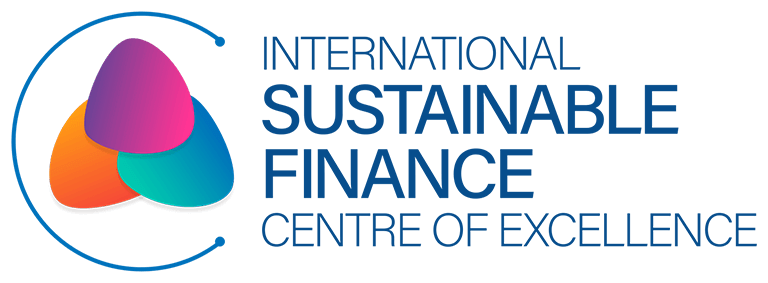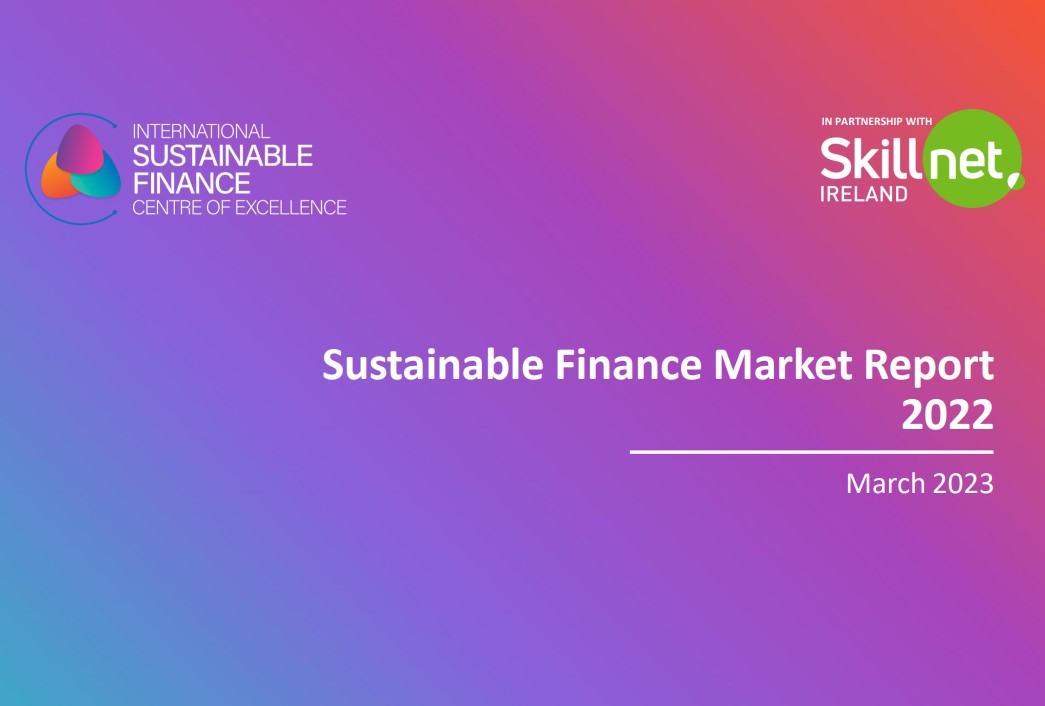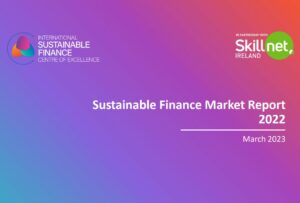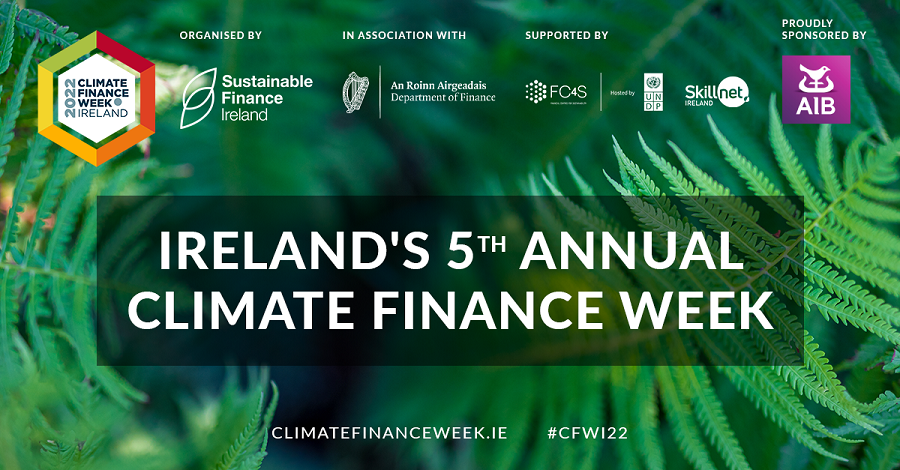Sustainable Finance Market Report
The Irish Sustainable Finance Market Report tells a story of National progress, an engaged Financial Services Sector and a transition journey
With the sustainable finance agenda front and centre, it is timely for us to review the progress that has been made by the financial sector in Ireland on its sustainable finance journey, and to bring focus to some key highlights from 2022. This review is consistent with the undertaking to annually Monitor, Measure and Report on Irish progress as part of Ireland’s Sustainable Finance Roadmap, which was published in October 2021.
This report is intended to be a high-level snapshot of where the various financial subsectors are, under six thematic areas: Market Growth, Impact, Risk Frameworks Disclosures, Net Zero and Challenges & Opportunities. The report is based on a review of existing publications, supplemented by a select number of stakeholder consultations and workshops. The findings of the report demonstrate that Sustainable Finance is firmly embedded within the financial ecosystem in Ireland, supported by a Government that has placed strategic importance on this area as per the updated Ireland for Finance strategy and the 2023 Action Plan.
We would like to thank our industry colleagues for their time and support in contributing to this report, including BPFI, IAIM, IAPF, Insurance Ireland and the Irish Funds Industry Association. Key takeaways include:
Ambition
- Ireland has an ambition to be a ‘vanguard’ of sustainable finance. It is a member of several leading public sector global sustainable finance initiatives, and the national Sustainable Finance Roadmap puts Ireland in a position to obtain its position as a leading sustainable finance centre by 2025.
- The International Sustainable Finance Centre of Excellence (ISFCOE) is focused on the practical acceleration of the sustainable finance agenda at a policy, regulatory and market level.
- At a policy and regulatory level, Ireland is heavily involved in the Coalition of Finance Ministers for Climate Action; the Central Bankers Network for Greening the Financial System (NGFS); and the UNDP Sustainable Insurance Forum for insurance Supervisors (SIF). Dublin is also the European base for the UNDP Financial Centres for Sustainability (“FC4S”) initiative.
Pioneering Action
- Ireland was one of the first countries in the world to withdraw public money from investment in fossil fuels through the ‘Fossil Fuel Divestment Act 2018’ and in 2021, the Sovereign Development Fund ISIF launched a €1bn five-year climate action investment programme.
- Among the first wave of European countries to issue Sovereign Green Bonds which now account for over 7% of the country’s total benchmark bonds.
- Through strategic investment supported by Skillnet Ireland, over 3,000 Irish located finance professionals across 600 firms have received some form of capacity building in sustainable finance since mid-2020, underpinning Ireland’s ambition to be a leading sustainable financial centre by 2025 in support of both domestic and international targets with the Sustainable Finance Skillnet internationally recognised as a global exemplar.
Engagement
- There is a high level of engagement on the sustainable finance agenda across Irish Financial Services Providers (FSPs) with C-suite support for sustainable finance initiatives evident.
- Prioritised engagement with (investee) companies that do not meet the minimum expectations of reporting carbon emissions or disclosing climate-related exposures, is a central focus across a number of FSPs. For example, in 2021, ISIF undertook 523 engagements, across its Global Portfolio, focussing on Net Zero, climate strategy and Task Force for Climate-related Financial Disclosures.
Market Growth
- The Irish Stock Exchange (Euronext Dublin) is a hub for ESG bond listings, with over 1,400 sustainable bonds on its platform.
- Domestic and International banks are actively engaged in green and sustainable finance across corporate and retail lending and debt capital markets activities.
- Throughout 2022, the growth of flows into Irish-registered ESG funds has continued, despite the challenging global market backdrop.
Net Zero
- Domestic banks are setting Science-based Targets as core aspects of their lending strategies.
- The Irish Stock Exchange’s net zero strategy includes a specific climate commitment in its “Fit for 1.5” programme.
- 60% of Irish insurance leaders have a carbon-neutral or net zero commitment in place.
Impact
- Measurement of estimated impact of sustainable finance issuances is evident, though maturity varies across sectors.
- Lack of global standards and best practice has resulted in an inconsistency in measurement approaches and definitions of impacts across sectors.
Risk Management & Disclosures
- Increases in supervisory expectations on integration of ESG into risk management, and disclosure requirements continue to evolve and pose challenges across all sectors.
- Disclosure Requirements have significantly increased, while some companies are voluntarily disclosing additional metrics and information (such as under the Recommendations of TCFD). Industry is on a journey with the granularity and quality of its disclosures.
Opportunities and Challenges
- There are competitive opportunities for Ireland to be a leading light in sustainable finance. An internationally recognised ecosystem for talent development and skills – initiatives including the establishment of Sustainable Finance Skillnet, and the launch of the ISFCOE in October 2022 are critical enablers.
- Availability of appropriately granular and accurate data across ESG spectrum, including climate, spatiotemporal, and energy performance is a notable challenge across all sectors.
Key Themes for 2023
- Increased focus on Biodiversity and Net Zero commitments.
- Greenwashing will remain high on the agenda along with ESG Data-Tracking and credible ESG data.
- The gap between the current availability of sustainable finance skills and what will be required to support growth will continue to be a key theme.
